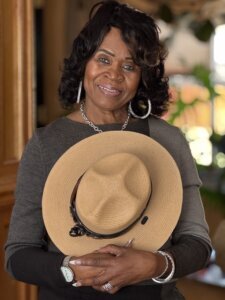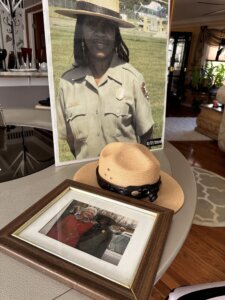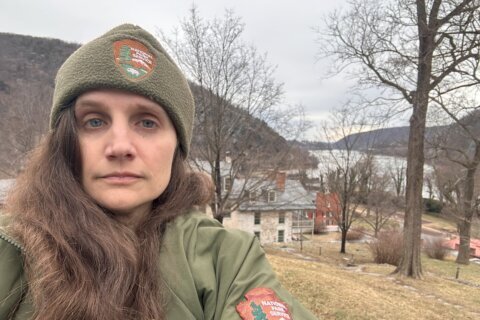This video is no longer available.
Throughout the month of March, WTOP is celebrating Women’s History Month. Join us on-air and online as we honor the achievements of women in our community.
It was 1958 and Tina Short was a little girl in a summer camp at Fort Dupont Park in D.C.
One day at camp, a mounted officer appeared on horseback.
“We all ran over, and I remember the camp director, Miss Vinna Freeman told us to come away, and he said, ‘It’s OK, they can pet the horse,'” she said.
Short said she knew immediately that she wanted to be a park ranger one day.
She recalls that Freeman told her: “Child, they don’t have any Black people, and they sure don’t have any colored girls.”
But Short’s mind was made up. “I just wanted a hat and a horse,” she said.
So, in 1972, when Short was working at the U.S. Postal Service, she got a chance to apply at the National Park Service.
She began her career at a time when few women worked as rangers anywhere in the park service, and even fewer Black women filled those roles.
According to the NPS, Short was among the very first Black women to serve as a park ranger in the National Capital area.
Short was asked if she could type. When she said yes, she was asked if she could give her two weeks’ notice.

“I said, ‘Yeah.’ I gave my two weeks’ notice and moved downstairs and became a receptionist,” she said.
Her first uniform was not the current gray shirt and green trousers that people associate with the NPS park rangers today. Instead, Short wore an A-line style dress, deemed appropriate for women working under the park service at the time.
Short still didn’t have her horse and her hat, but she was on her way.
Signing up for every training opportunity possible, she was eager to advance.
In 1977, Short got the chance to attend the training for rangers in the Grand Canyon. It was exciting, but she had two little girls and wondered how she’d manage the travel expense.
“When the travel authorization came down, it had both of the girls’ names on it,” Short said.
She notified her supervisor who said they’d work out a payment plan so she could reimburse the cost of the girls’ travel.
Part of the training included a weeklong backpacking trip through the canyon that Short described as “scary.”
It was there she learned to rappel.
Asked how high it was, she thought for a moment, and said: “It really wasn’t high, but to me it was high!”
And there was the night when she curled up into her sleeping bag and recalled, “I think there was something else inside there other than me … I think it was mice,” she said with a shudder.
Once training ended, Short was back to where it all started: She was a ranger with the National Park Service at Fort Dupont Park.

“What I started was a day camp, just like the day camp I went to,” she said.
Short worked with D.C.’s Metropolitan Police and Park Police to provide programming and lunches: “And they came up and gave little training programs for the kids, it worked out really good.”
There was also free entertainment at the theater at Fort Dupont Park. She still remembers one evening’s lineup in 1978: jazz artist Ramsey Lewis, young D.C.-native Stacy Lattisaw and singer-songwriter Stephanie Mills.
Short said she wanted to create great programs for all visitors, but especially for the children who came to those summer camps. Many of the children came from low-income families.
“Sometimes, I figured they only came so they could eat lunch, have something to eat,” she said. But it also opened doors for the kids to experience a whole range of free activities.
“We went to the zoo, Rock Creek Park, the skating rink, we went swimming. We did everything I could possibly think that they could do,” Short said.
Just as teachers may hear from past students about how things turned out for them, Short said she’s learned that some of the children who attended those summer camps went on to become lawyers, doctors or work in the D.C. Mayor’s Office.
Looking back at the campers, she recalls them as “really, really, really good kids. I turned out some good kids from that park,” she said.
“It was a haven, a safe haven for kids,” she said of Fort Dupont Park.
‘The doors opened’ but she never got a horse
When Short was growing up, not every park was a safe haven for all children.
Short recalls the days when Glen Echo Park, home of the Dentzel Carousel that continues to draw crowds, was segregated.
Yet Short’s own daughter, Kym Elder, would follow in her mother’s footsteps to work for the National Park Service and served as a manager of Glen Echo Park. Elder currently oversees the 17 sites that make up the Civil War Defenses of Washington.
Short marveled at the changes that led to opportunities “that we never saw coming.”
Looking back on her career at a time when few Black women worked in the field, Short said, “The doors opened. They just opened for Black people. And I loved it!”
Short didn’t comment on the current turmoil in the federal government as the Trump administration continues to slash government staffing levels. She simply said she loved her job.
“I’d still say it’s a wonderful place to work,” she said.
Short never got her horse but she still has the distinctive “flat hat” park rangers wear.
She looks back on a career that she treasures. It’s one that allowed her to take a number of assignments throughout the United States, complete coursework at American University and serve as a member of search and rescue teams.
“Where else can you work, and work outdoors?” she said.
‘So willing to give the youth a chance’
LaToya Foster, a D.C. native who grew up in the Fort Dupont Park area, often cut through the park on her way to elementary and junior high school, and recalls being struck by the presence of Short in her park ranger uniform.
“Until I met Tina, I do not remember seeing a woman — and definitely not an African American woman — in that role. So, she definitely broke the mold,” Foster said.
As a result, Foster got her first summer job through the program run by then-Mayor Marion Barry. She worked alongside Short each summer for three years. Short’s kindness and style struck all the campers, Foster said.
“The kids would say she was really ‘fly,'” Foster said, referring to Short’s stylish look. “Even in her park uniform, she was a fashion statement!”
Foster is currently the director of the D.C. Office of Cable Television, Film, Music and Entertainment, and credits Short with encouraging her dream of working in media and entertainment.
“We had fun with Tina,” Foster told WTOP, adding that Short also provided structure for the kids.
“She was so nice, so engaging and so warm and so willing to give the youth a chance,” Foster said.
Get breaking news and daily headlines delivered to your email inbox by signing up here.
© 2025 WTOP. All Rights Reserved. This website is not intended for users located within the European Economic Area.







